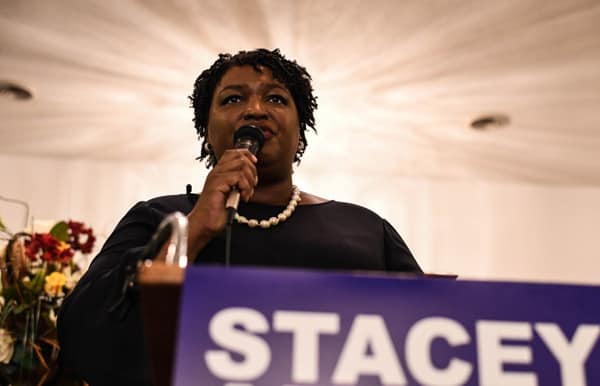Talk about what steps you’ll take beyond this initial phone banking to address these voters, and how else you’re fighting this purge?
So voter purges, when they happen, the most important part of the process is ensuring that the people who are likely to be purged know what’s coming and know what their rights are. We have been combing through the list since it was released a few weeks ago…verifying names, doing our initial vet of who should have been purged and who should not. There were [some] people whose names were [put] on the list improperly because they’ve recently voted.
And so what we will be doing is an initial texting and phone banking and that’s what’s happening on Thursday. That’s a massive event where we’re taking advantage of the attention that’s being paid in the state and the capacity to reach people because they are going to be more alert to this. We’re working with other organizations, we’re working with the state party and we’re working with anyone who has an interest in this across the aisle because voter purges are not [partisan] — in Georgia you don’t register by party and so we don’t know who’s being purged. But our mission is to make certain that no one is taken off of the rolls improperly.
Has voter suppression gotten enough attention this cycle?
On their own I think almost every one of the top-tier candidates has made a statement about voter suppression. [But] we have not heard enough of it on the national stage, and that’s why I’ve been trying to bring the debate to Georgia, and more importantly making certain that this is a [national] conversation. It’s hard to come to Georgia and not have a conversation about voter suppression.
{snip}
Would you be willing to be vice president for any candidate, not just Joe Biden?
Absolutely. I am a Democrat and I would be honored to help the Democratic ticket win and to serve.
{snip}
Is it a mistake to assume that because black voters in South Carolina are overwhelmingly supporting one candidate that black voters in other states would do the same?
We have 50 primaries and caucuses for a reason. South Carolina is in the spotlight early because it is the state that has the largest population of African American voters. But there is no community that is monolithic, including the black community. The larger question for every candidate is what will they do to make certain that they are speaking to voters in every single state, including Georgia. We may not be a Super Tuesday state, but we’re the very next week and we have the youngest population of a battleground state and we have the heaviest African American population.
{snip}
Despite the diversity of the field, the top four candidates right now are white. What does that tell you about the state of politics or about the Democratic Party?
Three things: One, this is a moment in time and we have not yet had our first contest and there’s a reason that it’s a 50-state contest that will stretch until June. No. 2, the distance between the fourth- and 10th-place candidate is not that large. So there’s always time for those metrics to shift. Three, I am excited because … the diversity of this field has forced a complexity of conversation that we have not previously seen. The fact that there are candidates who have to talk about issues they may have thought about but have never had to publicly grapple with — that means something. And whether or not that diversity is reflected in the eventual nominee, the diversity of the field has changed the conversation, and I think for the better.
{snip}
One of the conversations in the primary lately is whether or not Iowa and New Hampshire should continue to go first in the nominating process because they’re 90 percent white. Should Democrats change the order?
My focus is on getting through the order we have now and making sure we get all the candidates back to Georgia.
Did Elizabeth Warren consult or talk to you at all on the speech she’s giving Thursday about black women laborers?
We haven’t spoken about that direct topic recently, but she and I have had robust conversations over the last year-and-a-half as we’ve gotten to know each other, and I look forward to hearing what she says.
{snip}


















